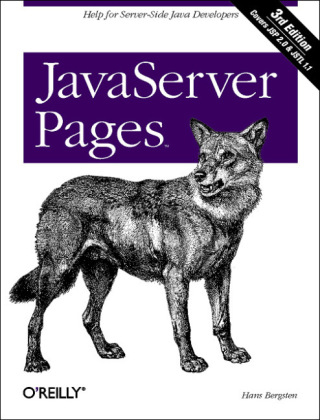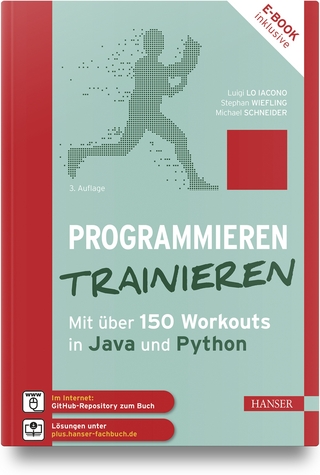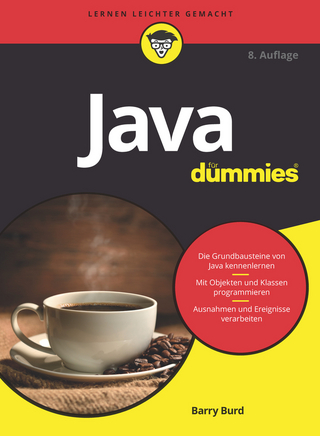
JavaServer Pages 3e
O'Reilly Media (Verlag)
978-0-596-00563-4 (ISBN)
JavaServer Pages (JSP) has built a huge following since the release of JSP 1.0 in 1999, providing Enterprise Java developers with a flexible tool for the development of dynamic web sites and web applications. While new point releases over the years, along with the introduction of the JSP Standard Tag Library (JSTL), have incrementally improved the rough areas of the first version of the JSP specification, JSP 2.0 takes this technology to new heights. JavaServer Pages, Third Edition, is completely revised and updated to cover the JSP 2.0 and JSTL 1.1 specifications. It includes detailed coverage of the Expression Language (EL) incorporated into JSP 2.0, the JSTL 1.1 tag libraries and the new function library, the new tag file format that enables custom tag library development without Java code, the simplified Java tag library API, improvements in the JSP XML syntax, and more. Further, it details setup of the Apache Tomcat server, JSP and JSTL syntax and features, error handling and debugging, authentication and personalization, database access, XML processing, and internationalization.
This book recognizes the different needs of the two groups of professionals who want to learn JSP: page authors interested in using JSP elements in web pages, and programmers concerned with learning the JSP API and using JSP effectively as a part of an enterprise application. If you're in the first group, you'll learn from the practical web application examples in the second part of the book. If you're in the latter group, you'll appreciate the detailed coverage of advanced topics in the third part, such as how to integrate servlets and JavaBeans components with JSP using the popular Apache Struts MVC framework, and how to develop custom tag libraries using the JSP API, with realistic examples that you can use as a springboard for your own libraries.
Hans Bergsten is the founder of Gefion Software, a company focused on Java services and products based on the J2EE technlogies. Hans has been an active participant in the working groups for both the servlet and JSP specifications from the time they were formed. He also contributes to other related JCP specifications, such as JSP Standard Tag Libraries (JSTL), and helped get the development of the Apache Tomcat reference implementation for servlet and JSP started as one of the initial members of the Apache Jakarta Project Management Committee.
Preface; Part I. JSP Application Basics; 1. Introducing JavaServer Pages; What Is JavaServer Pages?; Why Use JSP?; What You Need to Get Started; 2. HTTP and Servlet Basics; The HTTP Request/Response Model; Servlets; 3. JSP Overview; The Problem with Servlets The Anatomy of a JSP Page; JSP Processing; JSP Application Design with MVC; 4. Setting Up the JSP Environment; Installing the Java Software Development Kit; Installing the Tomcat Server; Testing Tomcat; Installing the Book Examples; Example Web Application Overview; Part II. JSP Application Development; 5. Generating Dynamic Content; Creating a JSP Page; Installing a JSP Page Running a JSP Page; Using JSP Directive Elements; Using Template Text; Using JSP Action Elements; 6. Using JavaBeans Components in JSP Pages; What Is a Bean?; Declaring a Bean in a JSP Page Reading Bean Properties; Setting Bean Properties; 7. Using Custom Tag Libraries and the JSP Standard Tag Library; What Is a Custom Tag Library?; Installing a Custom Tag Library; Declaring a Custom Tag Library; Using Actions from a Tag Library; 8. Processing Input and Output; Reading Request Parameter Values; Validating User Input Formatting HTML Output; 9. Error Handling and Debugging; Dealing with Syntax Errors; Debugging a JSP Application; Dealing with Runtime Errors; 10. Sharing Data Between JSP Pages, Requests, and Users; Passing Control and Data Between Pages; Sharing Session and Application Data; Online Shopping; Memory Usage Considerations 11. Developing Custom Tag Libraries as Tag Files; Creating and Using a Tag File; Accessing Attribute Values; Processing the Action Body; Processing Fragment Attributes; Exposing Data to the Calling Page Through Variables; Aborting the Page Processing Packaging Tag Files for Easy Reuse; 12. Accessing a Database Accessing a Database from a JSP Page; Validating Complex Input Without a Bean; Using Transactions; Application-Specific Database Actions; 13. Authentication and Personalization; Container-Provided Authentication; Application-Controlled Authentication Other Security Concerns; 14. Internationalization; How Java Supports Internationalization and Localization; Generating Localized Output; A Brief History of Bits; Handling Localized Input 15. Working with XML Data; Generating an XML Response; Transforming XML into HTML; Transforming XML into a Device-Dependent Format; Processing XML Data; 16. Using Scripting; Elements; Using page Directive Scripting Attributes; Implicit JSP Scripting Objects; Using Scriptlets; Using Expressions Using Declarations; Mixing Action Elements and Scripting Elements Dealing with Scripting Syntax Errors; 17. Bits and Pieces Buffering; Including Page Segments; Global Configuration Options Mixing Client-Side and Server-Side Code; Precompiling JSP Pages Preventing Caching of JSP Pages; Writing JSP Pages as XML Documents How URIs Are Interpreted; Part III. JSP in J2EE and JSP Component Development; 18. Web Application Models; The Java 2 Enterprise Edition Model; The MVC
| Erscheint lt. Verlag | 20.1.2004 |
|---|---|
| Reihe/Serie | O'Reilly Ser. |
| Verlagsort | Sebastopol |
| Sprache | englisch |
| Einbandart | Paperback |
| Themenwelt | Informatik ► Programmiersprachen / -werkzeuge ► Java |
| Mathematik / Informatik ► Informatik ► Web / Internet | |
| ISBN-10 | 0-596-00563-6 / 0596005636 |
| ISBN-13 | 978-0-596-00563-4 / 9780596005634 |
| Zustand | Neuware |
| Haben Sie eine Frage zum Produkt? |
aus dem Bereich


